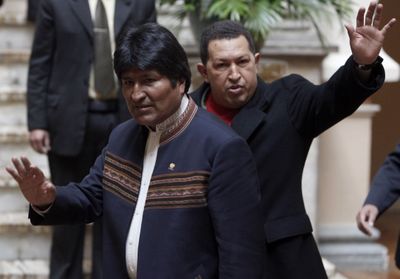Venezuela’s drug role soaring, report says
Cocaine shipments to U.S. quadrupled in three years

BOGOTA, Colombia – A report for the U.S. Congress on drug smuggling through Venezuela concludes that corruption at high levels of President Hugo Chavez’s government and state aid to Colombia’s drug-trafficking guerrillas have made Venezuela a major launching pad for cocaine bound for the United States and Europe.
Since 1996, successive U.S. administrations have considered Venezuela a key drug-trafficking hub, the Government Accountability Office report says. But now, it says, the amount of cocaine flowing into Venezuela from Colombia, Venezuela’s neighbor and the world’s top producer of the drug, has skyrocketed, going from an estimated 60 metric tons in 2004 to 260 metric tons in 2007. That amounted to 17 percent of all the cocaine produced in the Andes in 2007.
The report, which was first reported by Spain’s El Pais newspaper Thursday and obtained by the Washington Post on Friday, represents U.S. officials’ strongest condemnation yet of Venezuela’s alleged role in drug trafficking. It says Venezuela has extended a “lifeline” to Colombia’s Revolutionary Armed Forces of Colombia, or FARC, which the United States thinks now has a hand in the trafficking of 60 percent of the cocaine produced in Colombia.
The report, scheduled to be made public in Washington on Monday, drew an angry response from Chavez, whose government has repeatedly clashed with the United States. Speaking to reporters in Bolivia on Friday, the populist leader characterized the report as a political tool used by the United States to besmirch his country. He also said the United States, as the world’s top cocaine consumer, has no right to lecture Venezuela.
“The United States is the first narco-trafficking country,” Chavez said, adding that Venezuela’s geography – particularly its rugged 1,300-mile border with Colombia – makes it vulnerable to traffickers. He also asserted that Venezuela had made important gains in the drug war since expelling U.S. counter-drug agents in 2005, a measure the GAO says made Venezuela more attractive to Colombian traffickers.